
To mark the 72nd year of the Nakba – the catastrophe when Zionist forces evicted the majority of Palestinians from their homes and lands, occupying 78% of Palestine – Al-Shabaka reissues this insightful compilation of essays by its engaged scholars and analysts. These timely pieces dissect the betrayal of Palestine, the struggle of the refugees, the warning signs during the decades of seeking Palestinian-Israeli peace without justice, and strategies for the future. They give us strength at a time of looming annexation and the COVID-19 pandemic.
Download here, or click on the image below:
Al-Shabaka: The Palestinian Policy Network is an independent, non-partisan, and non-profit organization whose mission is to convene a multidisciplinary, global network of Palestinian analysts to...









